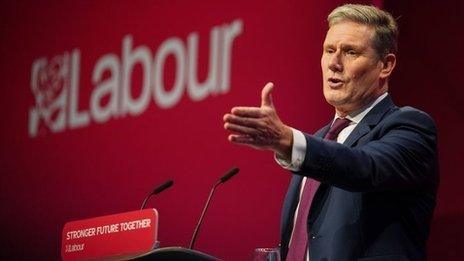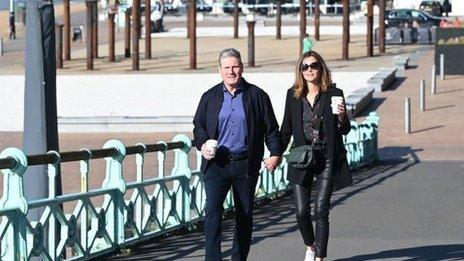Labour conference: Five things we learned as politicians gathered
- Published
It's been a rollercoaster ride by the Brighton seaside for Labour, as the party enjoyed its first full conference in two years.
Here are some things we didn't know a week ago.
1. Sir Keir's willing to take on far-left critics

Sir Keir told those barracking him in the Brighton Centre that he was about "changing lives" not "shouting slogans"
There have been a lot of headlines this week about rows between the leadership and the left.
Sir Keir may have largely avoided direct confrontation with his Corbynite critics, but he did manage to push through rule changes which will have a big effect on how the party governs itself.
Then came Wednesday's speech. Sir Keir faced down hecklers in the hall and told them that under his leadership, Labour would never stand on a manifesto that wasn't a serious plan for government.
Old hands watching the speech detected shades of former leader Neil Kinnock - who famously took on the far left Militant tendency at a Labour conference in 1985, external.
2. Sir Keir wants voters to know more about his background

Sir Keir and his wife Victoria took a stroll on the Brighton seafront ahead of his speech
We've heard stories about his family before, but Sir Keir looked back at his upbringing in his main conference speech.
He spoke about his mum's illness - she was diagnosed with Still's disease when he was young - and he recalled going into the intensive care unit to visit.
"Mum's bed was a riot of tubes and temperature devices. I could sense the urgency in the conversation of the four nurses on my mum's bed. I knew without being told that they were keeping her alive. I can hardly convey to you the emotion of seeing your mum in that condition," he said.
He went on to praise the nurses who looked after her.
And he spoke movingly about his dad, a tool maker, who, he said, gave him a "deep respect for the dignity of work".
3. The policy drought is over
Labour’s shadow chancellor says she would invest in "good jobs in the green industries of the future"
Patience was wearing thin in some Labour circles over Sir Keir Starmer's apparent determination not to reveal policies until the next election.
This week has seen some big announcements, although there is still a long way to go before we get the full picture.
Shadow Chancellor Rachel Reeves had most of the blockbusters - including a pledge to spend £28bn a year on greening the economy.
She also promised to scrap business rates and replace them with... something that has yet to be decided.
Sir Keir meanwhile announced plans for a major investment in education - to be funded by taxing private schools - as well as mental health services and to insulate 19 million homes in England to save energy.
4. There are still a lot of Corbyn fans
Sir Keir Starmer responded: "Shouting slogans or changing lives?" to hecklers
Cries of "Oh Jeremy Corbyn" regularly rang out in Brighton this week - and Sir Keir was barracked during his speech by left-wingers who believe he has trashed his predecessor's radical legacy.
He had some put-downs ready for them, saying he was about "changing lives" not "shouting slogans".
He appears very comfortable with the fact that he will never be loved by many party members, in the way that Corbyn is.
Mr Corbyn himself was much in evidence at fringe events and Q&A sessions - despite still being suspended from the Parliamentary party, a situation which shows little sign of being resolved.
He publicly backed Andy McDonald, the sole surviving member of his shadow cabinet, who dramatically quit his role on Monday in protest at Sir Keir's leadership and his failure to back a £15-an-hour minimum wage.
5. Scum was the word of the week
Angela Rayner on her 'scum' comments: "I am bombastic and I apologise if it offended the public."
Angela Rayner, Labour's deputy leader, ensured the word "scum" floated to the top of the social media pond after an outburst at a party event on Saturday night.
In a masterclass in how to keep a furore going, she doubled down on the attack on Boris Johnson, saying she would apologise for calling the prime minister "scum" if he said sorry for his past controversies.
OK, so some shadow cabinet colleagues - including Sir Keir - seemed less than impressed by her choice of language, but it went down a lot better among party members in Brighton.
A GMB delegate got a round of applause on Tuesday when he read out the Oxford English Dictionary definition of scum: "A very bad or immoral person or group of people" - an accurate description of the government, he said.
Conference was rounded off with a final volley from Ms Rayner, who said she understood people being upset by her language and said she was just "bombastic".